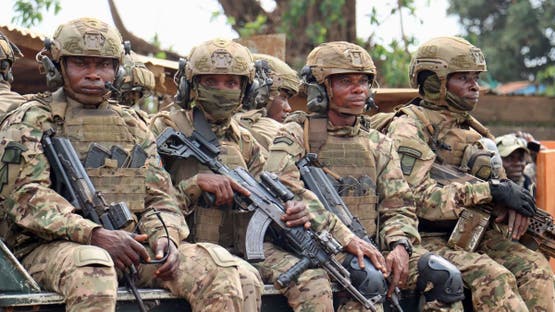Rwandan-supported M23 rebels have launched an assault on Congolese government forces in South Kivu province, ending a two-day period of relative calm. Intense shelling commenced on Tuesday morning, just three days following a summit of East and Southern African leaders that advocated for an immediate and unconditional ceasefire. The rebels have captured extensive territories in eastern DR Congo, including the significant city of Goma, and are now advancing towards Bukavu, the capital of South Kivu, which is another crucial urban center in the area. According to the latest figures from the UN, approximately 2,900 individuals have lost their lives since the beginning of January due to the ongoing conflict, with around 700,000 others displaced from their homes and thousands more sustaining injuries.
Fighting broke out on Tuesday near Ihusi, located approximately 70 kilometers (43 miles) from Bukavu and 40 kilometers from the South Kivu airport, according to security sources who spoke to the AFP news agency. A representative from the Congo River Alliance (AFC), which includes various rebel factions such as the M23, indicated that their forces might extend their operations to Bukavu.
Lawrence Kanyuka addressed the recent arrests of 84 military personnel by Congolese authorities for offenses including the killing of civilians near Bukavu, asserting, “If these crimes continue, we will take full responsibility to eliminate the threat at its origin and safeguard our people.”
In addition, reports indicate that many refugees fleeing the ongoing conflict are being coerced to return home by the M23. Although the M23 has refuted these claims, French broadcaster RFI has reported that several large camps for displaced individuals have been dismantled, forcing residents to return to their villages in conflict-affected areas.
Read more: Rebels attack DR Congo army ending lull in fighting
The UN’s humanitarian agency, Ocha, reported that the M23 had issued a 72-hour ultimatum for displaced individuals in Goma to return home. Kanyuka dismissed these claims as “propaganda,” asserting that those returning are doing so voluntarily and that the M23 does not force anyone to go back without adequate security assurances.
The M23, primarily composed of ethnic Tutsis, claims to be advocating for minority rights, while the government of the Democratic Republic of Congo contends that the rebels are attempting to seize control of the region’s extensive mineral resources.
Both the DR Congo and the UN have accused Rwanda’s Tutsi-led government of supporting the M23, a charge that Kigali has consistently denied. However, the official stance has recently evolved, with government representatives acknowledging that the fighting near their border poses a security threat.






